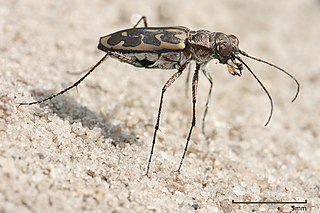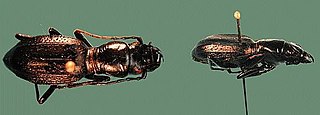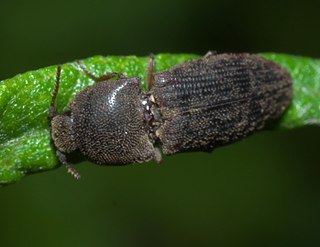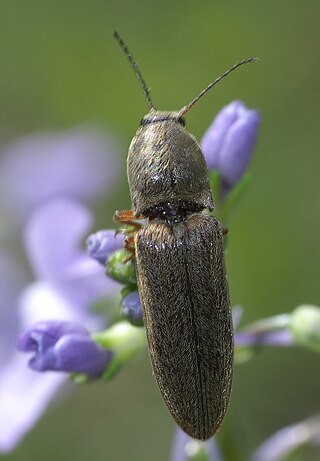
Tiger beetles are a family of beetles, Cicindelidae, known for their aggressive predatory habits and running speed. The fastest known species of tiger beetle, Rivacindela hudsoni, can run at a speed of 9 km/h, or about 125 body lengths per second. As of 2005, about 2,600 species and subspecies were known, with the richest diversity in the Oriental (Indo-Malayan) region, followed by the Neotropics. While historically treated as a subfamily of ground beetles (Carabidae) under the name Cicindelinae, several studies since 2020 indicated that they should be treated as a family, the Cicindelidae, which are a sister group to Carabidae within the Adephaga.

Pyrophorus is a genus of click beetle. They are one of several genera in the tribe Pyrophorini, all of which are bioluminescent. Their bioluminescence is similar to that of another group of beetles, the fireflies, although click beetles do not flash, but remain constantly glowing. They have two luminescent spots at the posterior corners of the pronotum, and another brighter light organ on the most-anterior surface of the ventral abdomen. This light organ is even brighter and can only be seen when in flight. Bioluminescent click beetles are found throughout tropical, subtropical and temperate America. Species from Texas, Florida, Puerto Rico, and Cuba are now in different genera in the tribe Pyrophorini, such as Deilelater and Ignelater.

Cicindela, commonly known as common tiger beetles, are generally brightly colored and metallic beetles, often with some sort of patterning of ivory or cream-colored markings. They are most abundant and diverse in habitats very often near bodies of water with sandy or occasionally clay soils; they can be found along rivers, sea and lake shores, sand dunes, around dry lakebeds, on clay banks, or woodland paths.

Omus dejeani is a species of flightless tiger beetle (Cicindelidae) that is found from British Columbia almost to northern California in dense, coastal forests. It is the largest species of the genus, at between 15 and 20 mm.

Amblycheila is a genus of flightless, nocturnal tiger beetles. There are eight species distributed across the southwestern United States and Mexico.

Eleodes is a genus of darkling beetles, in the family Tenebrionidae. They are endemic to western North America ranging from southern Canada to central Mexico with many species found along the Mexico-United States border. Some species have been introduced to Colombia. The name pinacate is Mexican Spanish, derived from the Nahuatl (Aztec) name for the insect, pinacatl, which translates as "black beetle."

Tenebrioninae is the largest subfamily of the darkling beetles (Tenebrionidae), containing flour beetles, among others. Tenebrioninae contains more than 20 tribes.

Buprestinae is a subfamily of beetles in the family Buprestidae, containing the following genera in the tribes Anthaxiini, Buprestini, Chrysobothrini, Melanophilini, and Xenorhipidini:
Cryptobatis is a genus of beetles in the family Carabidae, containing the following species:

Tetracha is a genus of metallic tiger beetles in the family Cicindelidae, formerly treated as a subgenus within the genus Megacephala. Tetracha species are exclusively New World in distribution, while Megacephala are exclusively Old World in distribution. There are ~100 described species in Tetracha.

Elaterinae is a subfamily of click beetles in the family Elateridae, containing 12 tribes worldwide.

Ellipsoptera cuprascens, the coppery tiger beetle, is a species of flashy tiger beetle in the family Cicindelidae. It is found in North America.

Agrypninae is a subfamily of click beetles in the family Elateridae. There are at least 130 genera and more than 430 described species in Agrypninae.

Dendrometrinae is a very large subfamily of click beetles in the family Elateridae, containing 10 tribes worldwide, including several formerly recognized subfamily-rank groups such as Athoinae, Crepidomeninae, Denticollinae, Oxynopterinae, Prosterninae, and Semiotinae now all reduced to tribal rank or lower.
Omus audouini, or Audouin's night-stalking tiger beetle, is a species of tiger beetle in the family Cicindelidae. It is found in North America. In the United States, it is found along the west coast, while in Canada it is very limited to Boundary Bay and a small patch along the coast of Victoria island.

Megacephalini is a tribe of big-headed tiger beetles in the family Cicindelidae.
Omus submetallicus, known generally as the lustrous night-stalking tiger beetle or Smith's brome, is a species of tiger beetle in the family Cicindelidae. It is found in North America.
Omus cazieri, or Cazier's night-stalking tiger beetle, is a species of tiger beetle in the family Cicindelidae. It is found in North America.

Omus californicus, the California night-stalking tiger beetle, is a species of tiger beetle in the family Cicindelidae. It is found in North America.

Manticorini is a tribe of tiger beetles in the family Cicindelidae. There are about 6 genera and more than 30 described species in Manticorini.
















